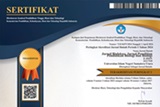Bridging pedagogy and practice: Hybrid collaborative learning based lesson study integrated with wahdatul ulum principles for pre-service biology teacher
Abstract
In an era that requires a balance between theory and practice for effective teaching, pre-service teachers need the skills to design integrated, contextual, and meaningful learning experiences. This study examines the impact of implementing a Hybrid Collaborative Learning-based Lesson Study, oriented toward Wahdatul Ulum, on the lesson planning skills of pre-service biology teachers. The study employs a mixed-method approach with a parallel convergent design. Quantitative data were collected through questionnaires administered to 83 students at the end of the Biology Lesson Planning course at a State Islamic University in North Sumatra, while qualitative data were obtained through semi-structured interviews. The instruments used included Likert scale questionnaires and interview sheets. Data was analyzed using descriptive statistics and thematic content analysis. The analysis that the skills developed include formulating learning indicators and objectives, preparing materials, and designing learning steps in accordance with instructional syntax. Teaching practice also aided students in identifying challenges and learning from peer teaching. These findings suggest that an approach integrating theory, practice, and religious values is effective for developing the pedagogical skills, character, and professionalism of pre-service biology teachers.
Keywords
Full Text:
PDFReferences
Bjuland, R., & Mosvold, R. (2015). Lesson study in teacher education: Learning from a challenging case. Teaching and Teacher Education, 52, 83–90. https://doi.org/10.1016/j.tate.2015.09.005
Chassels, C., & Melville, W. (2010). Collaborative, reflective, and iterative Japanese lesson study in an initial teacher education program: Benefits and challenges. Canadian Journal of Education Revue Canadienne De l’éducation, 32(4), 734–763.
Chen, S., & Zhang, B. (2019). Improving Prospective Teachers’ Lesson Planning Knowledge and Skills through Lesson Study. In R. Huang, A. Takahashi, & J. P. Da Ponte (Eds.), Theory and Practice of Lesson Study in Mathematics (pp. 549–575). Springer International Publishing. https://doi.org/10.1007/978-3-030-04031-4_27
Cresswell, J. W. (2012). Educational Research. Planning, Conducting, and Evaluating Quantitative and Qualitative Research 4th Edition. Pearson International Edition.
Crichton, H., Valdera Gil, F., & Hadfield, C. (2021). Reflections on peer micro-teaching: Raising questions about theory-informed practice. Reflective Practice, 22(3), 345–362. https://doi.org/10.1080/14623943.2021.1892621
Damayanti, S. (2019). The Challenges Faced by the Model Teachers in Implementing Lesson Study. Ethical Lingua: Journal of Language Teaching and Literature, 6(1), 40–44. https://doi.org/10.30605/ethicallingua.v6i1.1170
Ernawati, E., & Safitri, R. (2017). Analisis kesulitan guru dalam merancang Rencana Pelaksanaan Pembelajaran mata pelajaran fisika berdasarkan Kurikulum 2013 di kota Banda Aceh. Jurnal Pendidikan Sains Indonesia, 5(2), 49–56. https://doi.org/10.24815/jpsi.v5i2.9817
Farhang, Q., Hashemi, S. S. A., & Ghorianfar, S. M. (2023). Lesson Plan and Its Importance in Teaching Process. International Journal of Current Science Research and Review, 06(08). https://doi.org/10.47191/ijcsrr/V6-i8-57
Frick, L., Carl, A., & Beets, P. (2010). Reflection as learning about the self in context: Mentoring as catalyst for reflective development in pre-service teachers. South African Journal of Education, 30, 421–437.
Ganesh, B., & Matteson, S. M. (2010). The Benefits of Reteaching Lessons in Preservice Methods Classes. Action in Teacher Education, 32(4), 52–60. https://doi.org/10.1080/01626620.2010.549718
Golightly, A., & Westhuizen, C. P. V. D. (2016). An assessment of Hybrid Collaborative Learning in geography micro-teaching: A South African case study. International Journal of Educational Sciences, 12(2), 139–154. https://doi.org/10.1080/09751122.2016.11890421
Gutierez, S. B. (2021). Collaborative lesson planning as a positive ‘dissonance’ to the teachers’ individual planning practices: Characterizing the features through reflections-on-action. Teacher Development, 25(1), 37–52. https://doi.org/10.1080/13664530.2020.1856177
Harahap, S., Simamora, A., Nuruddin, A., Azmi, F., Nasution, H. B., Muzakkir, Siahaan, A., Safaruddin, Zulham, Soiman, Jamil, M., Syahminan, Mhd., & Siregar, P. (2019). Wahdatul ‘Ulum Paradigma Intergrasi Keilmuan dan Karakter Lulusan Universitas Islam Negeri Sumatera Utara Medan. IAIN Press.
Hervas, G., Medina, J. L., & Sandín, M. P. (2020). Participants’ views of the use of video in lesson study in higher education in Spain: An exploratory multiple case study. Journal of Research on Technology in Education, 52(4), 461–473. https://doi.org/10.1080/15391523.2020.1734509
Irzawati, I. (2023). The pros and cons of integrating collaborative learning into lesson plan design. PROGRES PENDIDIKAN, 4(1), 1–11. https://doi.org/10.29303/prospek.v4i1.325
Jayanti, U. N. A. D. (2022). Lesson Study berbasis Hybrid Collaborative Learning berorientasi Wahdatul Ulum: Deskripsi proses dan hasil belajar mahasiswa. BEST Journal (Biology Education, Sains and Technology), 5(2), 410–415.
Jayanti, U. N. A. D., Adlini, M. N., & Khairuna, K. (2020). Profil keterampilan menyusun skenario pembelajaran mahasiswa calon guru biologi perguruan tinggi keagamaan. Jurnal Biolokus, 3(1), 265. https://doi.org/10.30821/biolokus.v3i1.720
John, P. D. (2006). Lesson planning and the student teacher: thinking the dominant model. Journal of Curriculum Studies, 38(4), 483–498. https://doi.org/10.1080/00220270500363620
Karlström, M., & Hamza, K. (2021). How Do We Teach Planning to Pre-service Teachers – A Tentative Model. Journal of Science Teacher Education, 32(6), 664–685. https://doi.org/10.1080/1046560X.2021.1875163
König, J., Bremerich-Vos, A., Buchholtz, C., Fladung, I., & Glutsch, N. (2020). Pre–service teachers’ generic and subject-specific lesson-planning skills: On learning adaptive teaching during initial teacher education. European Journal of Teacher Education, 43(2), 131–150. https://doi.org/10.1080/02619768.2019.1679115
Leedy, P. D., & Ormrod, J. E. (2015). Practical Research. Planning and Design 11th Edition. Pearson Education.
Lewis, C., Friedkin, S., Emerson, K., Henn, L., & Goldsmith, L. (2019). How Does Lesson Study Work? Toward a Theory of Lesson Study Process and Impact. In R. Huang, A. Takahashi, & J. P. Da Ponte (Eds.), Theory and Practice of Lesson Study in Mathematics (pp. 13–37). Springer International Publishing. https://doi.org/10.1007/978-3-030-04031-4_2
McDuff, E. (2012). Collaborative Learning in an Undergraduate Theory Course: An Assessment of Goals and Outcomes. Teaching Sociology, 40(2), 166–176. https://doi.org/10.1177/0092055X12437968
Mostofo, J. (2014). The impact of using lesson study with pre-service mathematics teachers. Journal of Instructional Research, 3, 55–63.
Mutton, T., Hagger, H., & Burn, K. (2011). Learning to plan, planning to learn: The developing expertise of beginning teachers. Teachers and Teaching, 17(4), 399–416. https://doi.org/10.1080/13540602.2011.580516
Nami, F., Marandi, S. S., & Sotoudehnama, E. (2016). CALL teacher professional growth through lesson study practice: An investigation into EFL teachers’ perceptions. Computer Assisted Language Learning, 29(4), 658–682. https://doi.org/10.1080/09588221.2015.1016439
Nunung, A. (2021). Identifikasi Kesulitan dalam Penyusunan Rencana Pelaksanaan Pembelajaran (RPP) Kurikulum 2013 di Sekolah Dasar Gugus 1 Kediri Tahun Ajaran 2020/2021 [Universitas Mataram]. http://eprints.unram.ac.id/20713/
Okolie, U. C., Mlanga, S., Oyerinde, D. O., Olaniyi, N. O., & Chucks, M. E. (2022). Collaborative learning and student engagement in
practical skills acquisition. Innovations in Education and Teaching International, 59(6), 669–678. https://doi.org/10.1080/14703297.2021.1929395
Ravindra, J. R. (2015). Use of web-based instruction in teaching learning an innovative practice of the Institute. Research Front, 2, 207–210.
Richards, J. C., & Farrell, T. S. C. (2011). Practice Teaching: A Reflective Approach (1st ed.). Cambridge University Press. https://doi.org/10.1017/CBO9781139151535
Rohayati, E., Diana, S. W., & Priyandoko, D. (2018). Lesson plan profile of senior high school biology teachers in Subang. Journal of Physics: Conference Series, 1013, 012003. https://doi.org/10.1088/1742-6596/1013/1/012003
Rusznyak, L., & Walton, E. (2011). Lesson planning guidelines for student teachers: A scaffold for the development of pedagogical content knowledge. Education as Change, 15(2), 271–285. https://doi.org/10.1080/16823206.2011.619141
Ruys, I., Keer, H. V., & Aelterman, A. (2012). Examining pre-service teacher competence in lesson planning pertaining to collaborative learning. Journal of Curriculum Studies, 44(3), 349–379. https://doi.org/10.1080/00220272.2012.675355
Siregar, P., Betawi, I., & Ababil, J. B. (2019). Paradigma Wahdah Al-‘Ulum Perspektif Transdisipliner. PT Raja Grafindo Persada.
Strijbos, J.-W., & Fischer, F. (2007). Methodological challenges for collaborative learning research. Learning and Instruction, 17(4), 389–393. https://doi.org/10.1016/j.learninstruc.2007.03.004
Sugiyono. (2014). Metode Penelitian Pendidikan: Pendekatan Kuantitatif, Kualitatif dan R&D. Alfabeta.
Susena, Triwahyuningsih, Supriyadi, & Arief, D. B. (2016). Kesulitan-kesulitan guru dalam mengembangkan Rencana Pelaksanaan Pembelajaran (RPP) mata pelajaran Pendidkan Kewarganegaraan (PKn) Kurikulum 2013 di SMP Se Kota Yogyakarta. The Progressive and Fun Education Seminar. The Progressive and Fun Education Seminar, Yogyakarta. http://publikasiilmiah.ums.ac.id/handle/11617/7649
Thomas, D. R. (2006). A general inductive approach for analyzing qualitative evaluation data. American Journal of Evaluation, 27(2), 237–246. https://doi.org/10.1177/1098214005283748
Vygotsky, L. S., & Cole, M. (1978). Mind in Society: Development of Higher Psychological Processes. Harvard University Press.
Widjaja, W., Vale, C., Groves, S., & Doig, B. (2017). Teachers’ professional growth through engagement with lesson study. Journal of Mathematics Teacher Education, 20(4), 357–383. https://doi.org/10.1007/s10857-015-9341-8
Yi Jia. (2005). Building a Web-Based Collaborative Learning Environment. 2005 6th International Conference on Information Technology Based Higher Education and Training, F2D-7-F2D-9. https://doi.org/10.1109/ITHET.2005.1560279
Zaragoza, A., Seidel, T., & Santagata, R. (2023). Lesson analysis and plan template: Scaffolding preservice teachers’ application of professional knowledge to lesson planning. Journal of Curriculum Studies, 55(2), 138–152. https://doi.org/10.1080/00220272.2023.2182650
DOI: http://dx.doi.org/10.30821/biolokus.v7i2.1933
Refbacks
- There are currently no refbacks.
Copyright (c) 2024 Jurnal Biolokus: Jurnal Penelitian Pendidikan Biologi dan Biologi
indexed by :












